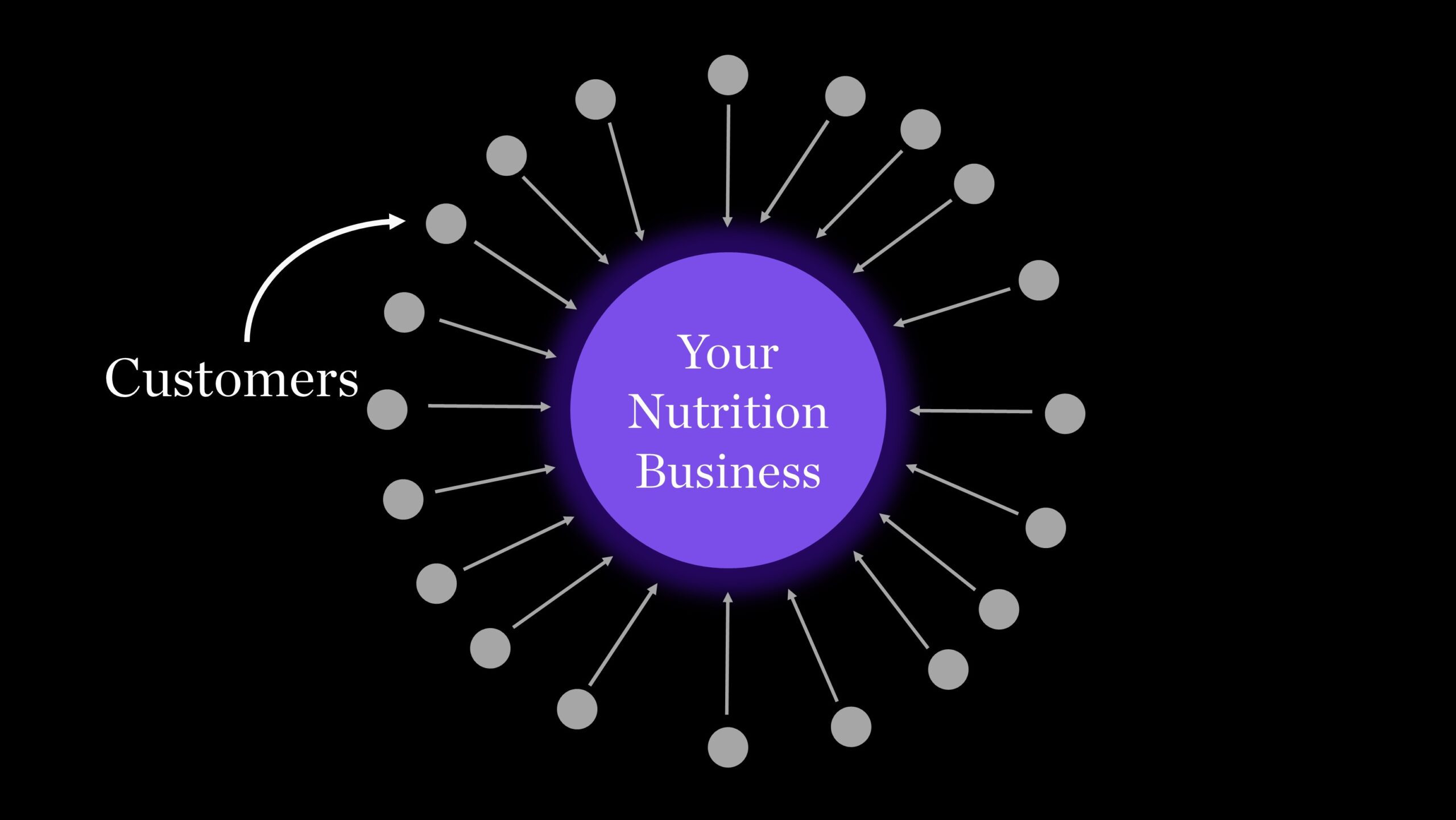Article last updated on August 12, 2023
Are you a nutritionist looking to grow your client base and expand your business? In today’s competitive market, effective marketing is crucial for success.
By implementing the right strategies, you can attract more clients and establish yourself as a trusted expert in your field.
Marketing for nutritionists involves more than just promoting your services; it’s about building a strong brand, establishing credibility, and connecting with your target audience.
Whether you’re just starting out or have been in the industry for years, this listicle will provide you with valuable insights and actionable tips to take your marketing efforts to the next level.
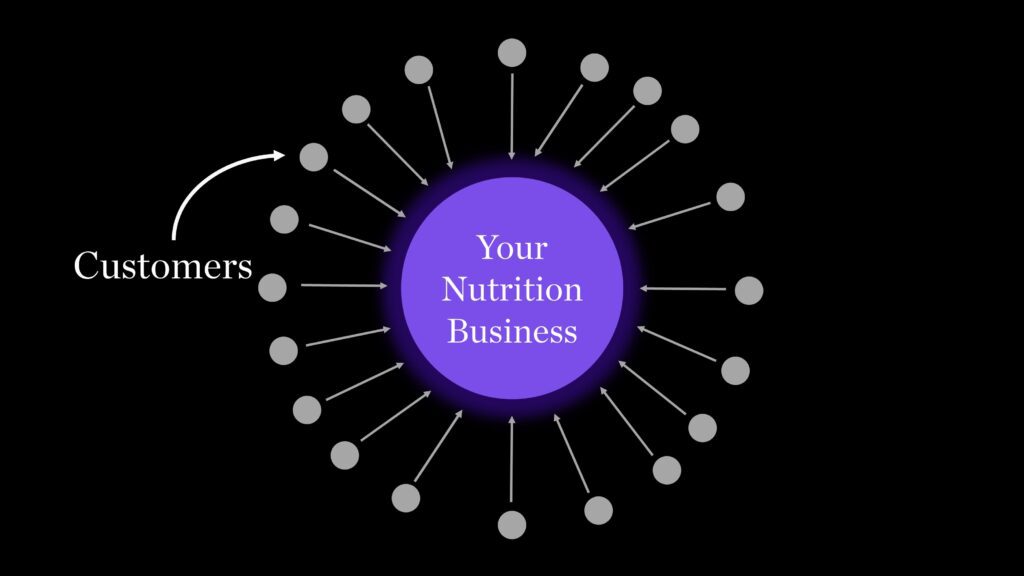
From social media marketing to content creation and networking, we’ll cover a range of strategies that will help you stand out from the competition and reach a wider audience.
So, if you’re ready to grow your nutrition business and make a bigger impact, keep reading for our top marketing ideas and techniques.
1. Building a Strong Personal Brand
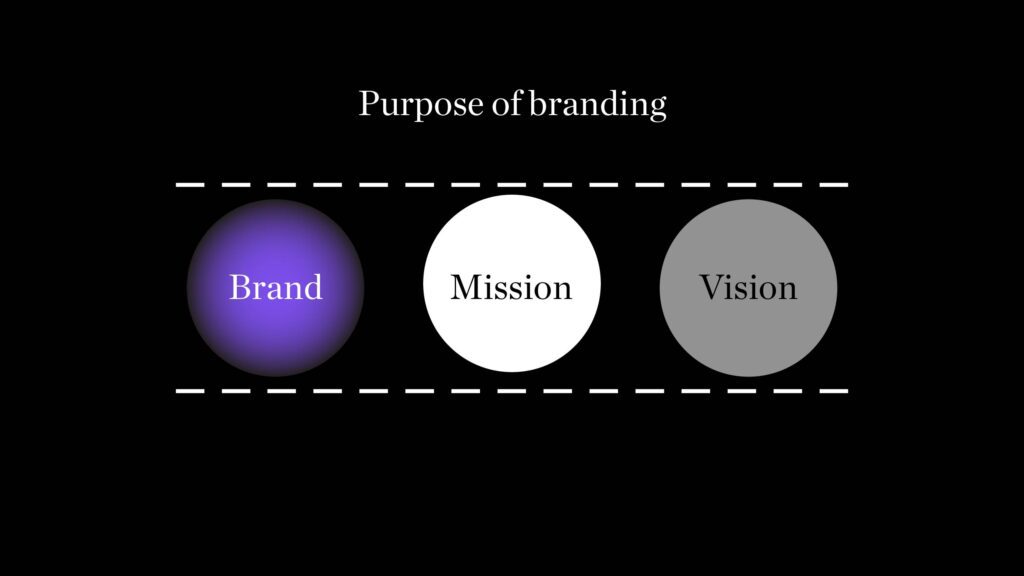
Building a strong personal brand is essential to success in any industry, especially for nutritionists. A well-crafted personal brand will help you stand out from the competition and establish yourself as an expert in your field.
The key to creating a powerful personal brand is to be authentic and true to yourself.
Start by making sure you have a clear understanding of your values, goals, and services. This will help you define your niche and target the right audience.
So, first, we need to define your target audience. Who is your ideal client? What do they need?
Define your niche and target audience
It’s essential to identify the needs of your ideal client and develop strategies that will meet those needs.
Start by asking yourself who your ideal client is.
- What are their goals?
- What do they need help with?
- What lifestyle or dietary changes do they want to make?
Once you have a clear understanding of your target audience, you can tailor your marketing strategies to meet their needs.
Create a unique value proposition
In order to stand out from the competition, it’s essential to create a unique value proposition. This means identifying what makes you different from other nutritionists and what sets you apart.
It’s important to think about the problems your clients are facing and how you can help them solve them.
Think about the needs of your target audience and how you can provide value that they won’t find anywhere else.
To give you some examples, you could focus on a specific dietary approach or specialize in health coaching for those with chronic illnesses.
Develop an engaging website
It’s important to have a strong online presence if you want to reach a wider audience. Invest in creating a professional website that is easy to navigate and includes all the information potential clients need.
Your website should include clear calls to action, such as “Book an Appointment” or “Sign Up for a Free Consultation.”
Think of your website as your virtual business card; make sure it’s easy to find and includes all the necessary information.
But please do not overwhelm your website visitors with too much information. Keep it simple and focus on the most important details.
Establish yourself as a thought leader through content creation
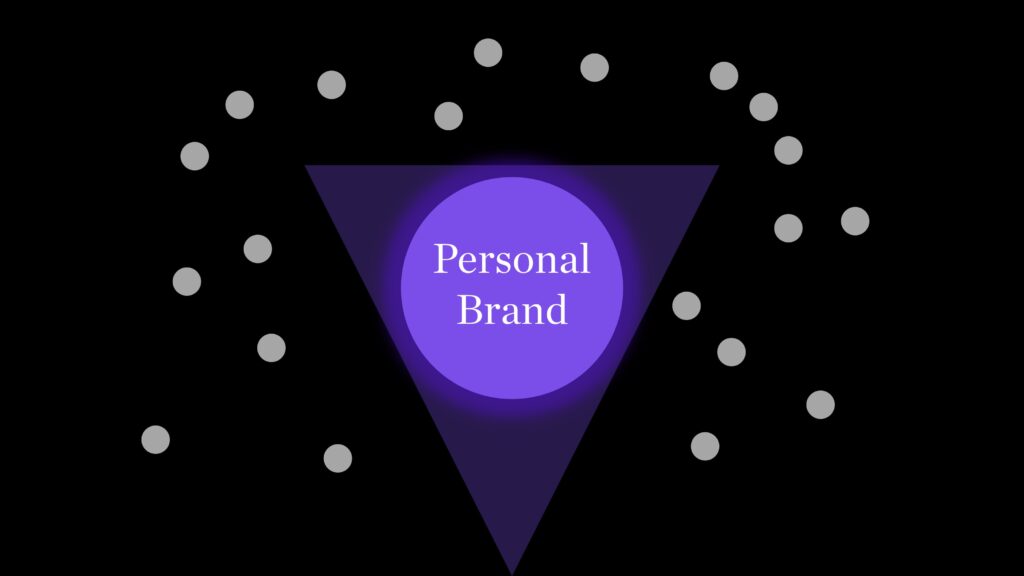
Ah, this is my favorite part… Content creation is an effective way to establish yourself as a thought leader and build credibility in your industry.
Developing content that offers valuable advice and insights will help you connect with your audience and demonstrate your expertise.
Creating content for blogs, social media, and other online platforms can help you reach a larger audience and position yourself as an authority in nutrition.
The reason this is so important is because it will help increase your visibility and credibility in the eyes of potential clients.
On top of that, it’s almost free to create content, so you don’t have to worry about investing too much time or money.
Now that we have laid the foundation for your target audience and personal brand, it’s time to talk about testimonials.
2. Leveraging Testimonials and Success Stories

Testimonials are a powerful way to showcase the value of your services and demonstrate the results you get for your clients. When potential clients see that you have helped others achieve their goals, they will be more likely to hire you.
When asking for testimonials, make sure to ask open-ended questions that will allow clients to provide detailed feedback about their experience. This will create more powerful testimonials that are more convincing to potential clients.
Share success stories and before-and-after transformations
Sharing success stories and before-and-after transformations is a great way to demonstrate the impact of your services.
By showcasing the progress your clients have made, you can provide proof that your work has tangible results.
When sharing these stories, use a tone of understanding and empathy. Showcase their struggles as well as their successes in order to create an emotional connection with potential clients.
You should most definitely put this type of content on your website and social media channels.
Think about how you would feel if you were a potential client trying to find the right nutritionist for them. Reading success stories would make you more likely to believe that you can achieve your health goals too.
Now, let’s talk about expanding brand awareness through networking.
3. Networking and Collaboration

When it comes to standing out in a competitive market, networking and collaboration are key.
Building relationships with other professionals in your industry can help you create opportunities for growth and visibility.
- Start by connecting with peers who may have similar interests or goals as you do. Connecting with like-minded individuals will provide you with valuable insight and help open up new opportunities.
- Consider joining groups or associations related to nutrition. These organizations may be able to provide you with resources and connections that can help you grow your business.
- Offer complimentary workshops or seminars to establish credibility and reach a wider audience. Workshops and seminars are great ways to introduce yourself and demonstrate your expertise. These events can be used to connect with potential clients, establish credibility, and spread the word about your services.
It is incredible how much you can learn from other nutritionists or dietitians. You can use this knowledge to improve your services and stand out from the crowd.
4. Utilizing Referral Programs and Incentives

People are more likely to recommend your services if there is something in it for them. This could be anything from discounts to free consultations or even free products. You can also create a loyalty program for returning clients.
By offering rewards, you can encourage people to recommend your services and increase word-of-mouth referrals.
Strategies for a successful nutritional referral program
Successful referral programs require a strategy built on trust and mutual benefit.
- To ensure success, it’s first important to ensure that your current clients are satisfied with their experience and will be willing to recommend you to others.
- Then, establishing clear incentives for referrals is the next step.
- You should make sure to explain the referral program thoroughly and accurately so that there are no misunderstandings. This way, your clients will know exactly what to expect when they refer someone to you.
- In addition, ensure that the referral process is simple and straightforward. Making sure that all of these pieces are in place will create a sustainable and successful referral program that increases visibility for your business.
In conclusion, there are many ways to stand out in a competitive market as a nutritionist.
Utilizing social media platforms, SEO, content marketing, networking and collaboration, and referral programs are all effective strategies to increase brand awareness and attract potential clients.
With a solid foundation of valuable content and a presence on multiple digital marketing channels, you can create a strong platform to position yourself as the go-to nutrition expert.
Now, let’s talk about building relationships with healthcare professionals.
5. Building Relationships with Healthcare Professionals

Developing strong relationships with these individuals can help you establish credibility and connect with potential clients.
Before reaching out, it’s important to first understand the needs of your target audience. What are their challenges? What do they need? Answering these questions will allow you to develop a more targeted approach.
Reaching out to healthcare professionals through email, social media, or in-person meetings are all great ways to start building relationships.
Try to provide value-added content that is relevant and useful to their audience. This could be anything from helpful tips related to nutrition and health, relevant industry news, or even discounts on your services.
By engaging with healthcare professionals, you can create a mutually beneficial relationship that will help you expand your reach and grow your client base.
6. Providing Quality Content and Resources

Creating quality content and resources is essential for any successful marketing strategy. Nutritionists should strive to produce content that is valuable, informative, and relevant to their target audience.
By providing helpful advice, nutrition tips, recipes, and other materials about the topics you are most knowledgeable about, you can build trust with your potential customers and establish yourself as an expert in the field.
Create and share informative and engaging content on your website and social media channels
YouTube can be an incredible tool to reach more people and provide useful information.
On top of that, when you create a video, you can transcribe it and use the content for other marketing materials, such as blog posts.
When that is done, you can summarize the information and use tools like Canva to create slides and post them on Instagram and LinkedIn.
Also, X (formerly known as Twitter) is pushing content that is video-based, so it’s important to add that to your list of places where you should post content.
Offer free resources such as meal plans, recipes, or educational guides to attract and engage your target audience
When people start noticing you more and more due to the content you have created, they may start asking for more.
That’s why offering free resources such as meal plans, recipes, or educational guides can be a great way to start building trust with your prospective clients and help them better understand the value of nutrition.
You can also provide free consultations with potential clients and promote these offers through social media channels or email campaigns. This is a good way to show your expertise in the field and get more leads.
7. Utilizing Online Advertising and SEO

I am not huge on the idea of “buying” traffic, which is why I recommend utilizing both organic and paid methods to increase your website’s visibility.
Organic SEO can help you drive more targeted traffic to your website and provide a better return on investment in the long run.
Content marketing, optimizing meta tags, and creating informative blog posts are all effective ways to improve your search engine rankings and bring organic traffic to your website.
But let’s cover both aspects of how you can market your nutrition services.
Invest in targeted online advertising campaigns to reach your target audience

There are a few effective ways to do this.
- First, you can set up Google AdWords and/or Bing Ads campaigns to target potential customers searching for nutrition services or resources in your area.
- You can also create Facebook, X (formerly Twitter), and Instagram ads that target people who are interested in health and nutrition topics. This will help get your message out to the right people and increase brand awareness.
- TikTok ads are a relatively new tool that you can also use to promote your business.
- In addition, don’t forget about the power of influencers when it comes to digital marketing.
I will try to give you a short explanation of which network might work best for you.
- If your target market is people older than 30, it might be best to focus on X, Facebook, and Instagram.
- If you are targeting millennials and younger generations, then TikTok, YouTube, and Instagram should be your main platforms.
- If you have a product that is purely transactional, For example, if you sell nutrition bars for vegans, you might want to consider Google or Bing Ads.
No matter which of the platforms you choose, make sure to start building a following and create valuable content that will help your target customers.
Optimize your website and content for search engines to improve visibility and organic traffic
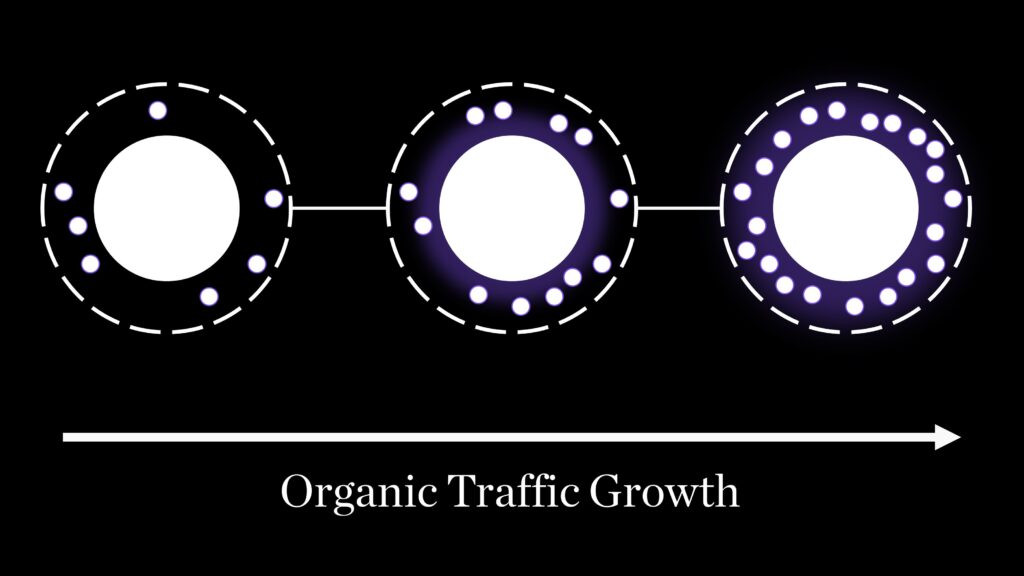
The thing about SEO is that it’s a long-term investment.
You need to create quality content on a regular basis and optimize your website for search engines. This will help you stay ahead of the competition and increase organic traffic to your website.
Take a look at competition:
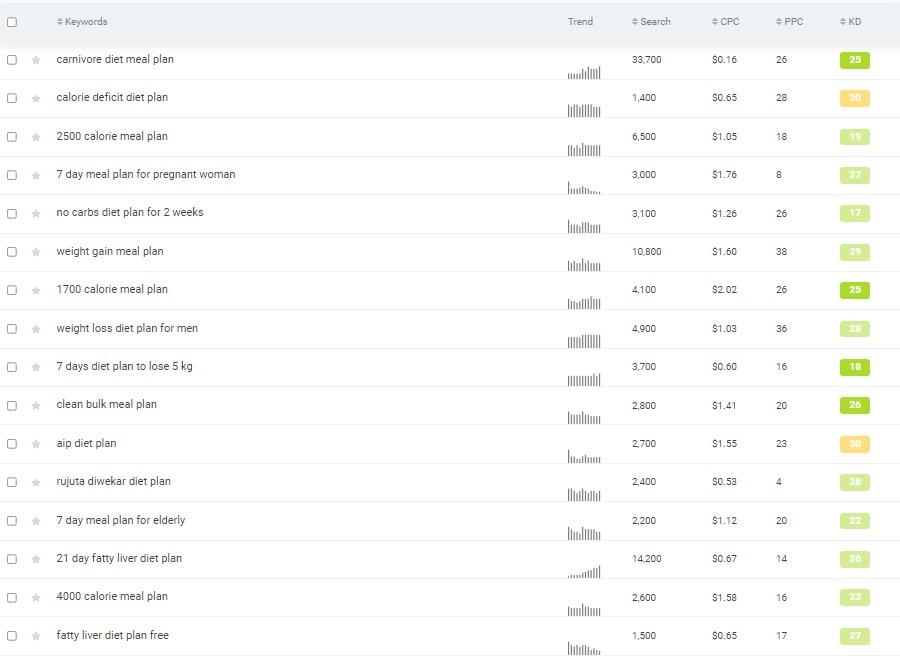
Competition for organic growth is not THAT high.
This should not be a big problem if you know your topic well, because you can write useful content that resonates with your target audience.
Now that all the tools are available, it’s easier than ever to optimize your website for search engines. You can record video or audio and then transcribe it. You can create podcast episodes and embed them on your website.
By creating content that is optimized for SEO, you can rank higher in the search engine results pages and increase website traffic. This will help you get more leads and convert more customers.
8. Hosting Workshops, Webinars, or Online Courses

One of the best ways to stand out in a competitive market is by hosting workshops, webinars, or online courses related to nutrition.
These events offer a great way to connect with potential clients and educate them about proper nutrition. By offering valuable content, you can build trust and credibility with your target audience.
Just remember that having website traffic and awareness of your brand are the most fundamental parts.
Because if you create all these workshops, webinars, or online courses and nobody knows about them, you won’t get any sign-ups.
That being said, if you have mastered the fundamentals, then hosting events or courses can be a great way to stand out in the market and gain more leads.
Imagine if someone spent three hours learning about nutrition from you.
They may become your loyal customers not only because they learned something valuable but also because they have a personal connection with you.
9. Leverage Email Marketing and Mailing Lists
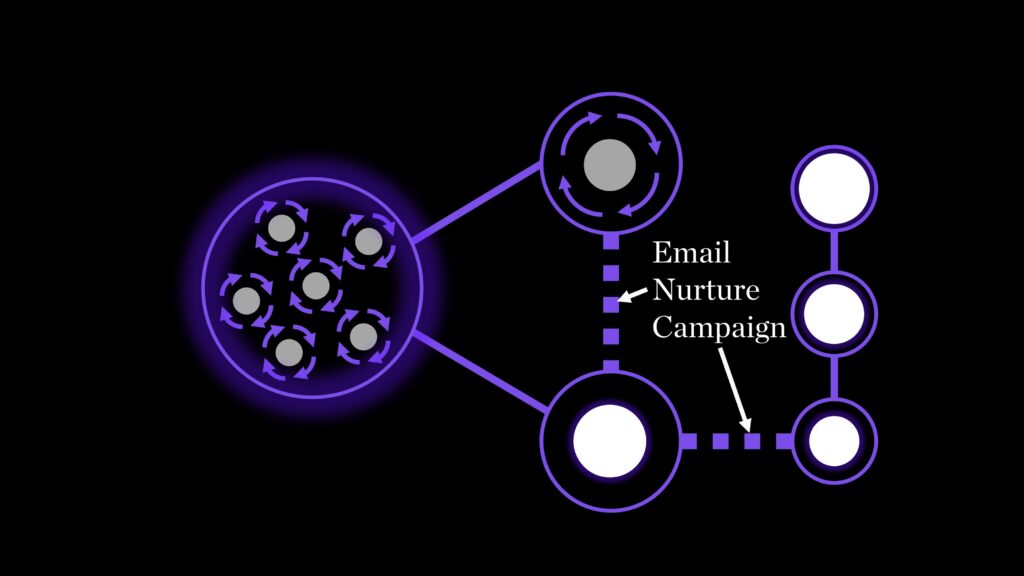
Email marketing is one of the most powerful tools for reaching potential customers and building relationships.
By using an email list, you can send newsletters, promotional emails, or even personalized messages to your potential customers.
You can also segment these lists to target specific audiences and offer relevant content to each group.
For example, if you have a nutrition practice, you can create email lists for clients who are interested in weight loss, healthy eating, or sports nutrition.
This way, you can send them relevant content and offers that are tailored specifically for them.
To create an email newsletter, you need an email address or a mailing list. You can add this to your website and encourage visitors to sign up for new webinars, workshops, and special offers.
You can also use tools like MailChimp or Beehiiv to create and send emails.
10. Collaborating with Influencers or Brand Ambassadors
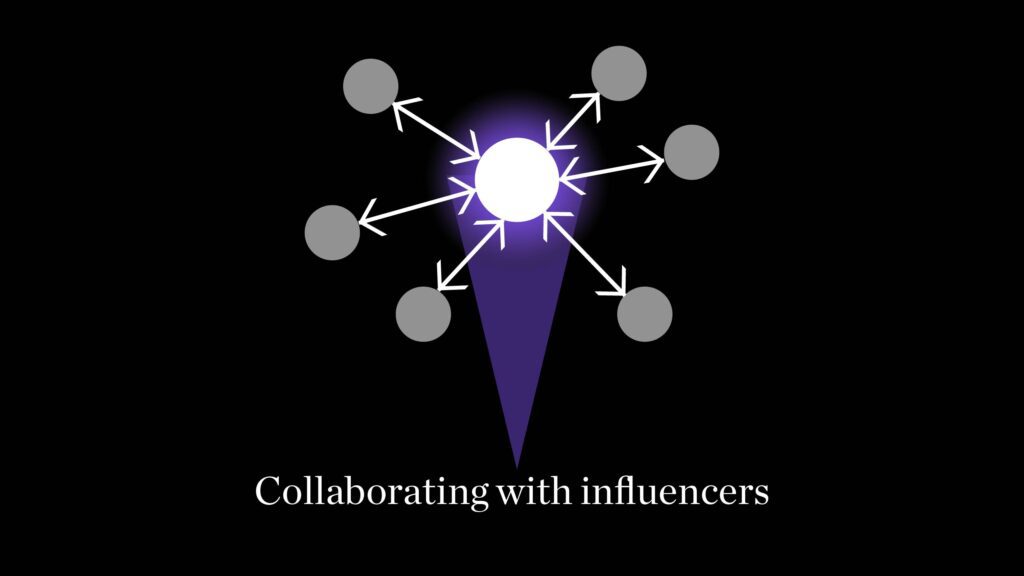
We have talked a bit about them in the sections above, but influencers or brand ambassadors can be a great asset if you want to stand out in a competitive market.
You can collaborate with them to create content that will help build your brand’s presence and reach more potential customers.
You can also use influencers to promote special offers and deals that are related to nutrition. This way, you can attract new leads and convert
Partner with influencers or brand ambassadors who align with your brand’s values and target audience
When it comes to partnering with influencers, it’s important to find those who align with your values and target audience.
Doing this will ensure that the content they create resonates with your audience and has a positive impact on your brand.
It’s also important to have a clear understanding of what you want from your partner and how you will measure success.
This way, you can ensure that everyone is on the same page and that specific goals are being met.
Imagine if you had an influencer partner promote your company’s nutrition plans, but they are carnivores and your brand is plant-based.
Your message will be confused, and you won’t have the desired outcome.
So, make sure to partner with influencers who can accurately understand your brand and reflect it in their content.
Frequently Asked Questions
After absorbing all the information above, you may still have some lingering questions about marketing for nutritionists.
In this section, we aim to provide answers to some of the most frequently asked questions in this field. So, let’s dive in and explore some common queries:
Why is marketing important for nutritionists?
Marketing for nutritionists is not just about throwing out some advertisements or posting on social media.
It’s the lifeblood of reaching the people who need your expertise the most.
Let’s break it down:
1. Connecting with Your Audience: The world of nutrition is filled with both enthusiasts who are passionate about healthy living and individuals desperately in need of guidance. Marketing allows you to connect with these people, making them aware of your services and how you can help them lead a healthier life.
2. Standing Out in a Competitive Field: There are many nutritionists out there, each with their own unique approach and specialization. Effective marketing enables you to highlight what makes you different, your unique value proposition. This sets you apart from others and helps potential clients understand why they should choose you.
3. Building Trust and Credibility: By consistently providing valuable content, insights, and engaging with your community, marketing helps you build a reputation as an expert in your field. This trust is paramount when it comes to health-related decisions.
4. Growing Your Business: Plain and simple, without marketing, how will people know about you? It’s through strategic marketing that you can grow your client base, collaborate with other professionals, and potentially expand into new services or areas.
5. Educating the Public: Marketing isn’t just about promotion. Through blogs, videos, workshops, etc., you can educate people about nutrition. This can lead to better overall awareness about healthy eating habits and how proper nutrition can improve quality of life.
6. Staying True to Your Values: If you love authenticity in business, marketing allows you to convey your values, ethics, and authenticity. Your marketing strategies can be a reflection of what you believe, attracting like-minded clients who resonate with your approach.
7. Leveraging Technology: We live in a digital world, and modern marketing leverages various online tools and platforms. This can help you reach a broader audience that you might not have been able to reach otherwise.
8. Flexibility and Adaptation: Marketing isn’t a one-size-fits-all strategy. It requires constant learning, tweaking, and adapting to new trends, ensuring that your approach remains relevant and effective.
Marketing for nutritionists is an intricate blend of art and science that goes beyond mere advertisement.
It’s about creating connections, educating, building trust, and growing in a way that aligns with your unique voice and values.
It’s not just something that’s nice to have; it’s a necessity to thrive in today’s world. And the beautiful part? It offers an open canvas to be as creative and authentic as you wish to be.
Should I specialize in a specific area of nutrition to stand out in the market?
Yes! Specializing in a specific area of nutrition is a great way to stand out. This will allow you to hone your expertise and target a particular audience with specialized services.
For example, you could focus on sports nutrition, vegan or vegetarian diets, heart health, weight-loss plans, etc.
By focusing on one aspect of nutrition and building deep knowledge in that area, you’ll become an expert and make yourself more attractive to potential clients.
Here are 20 examples of specializations you could focus on:
1. Sports nutrition
2. Vegan and vegetarian diets
3. Heart health
4. Weight-loss plans
5. Diabetes management
6. Gluten-free diets
7. Nutritional counseling for pregnant women
8. Nutritional counseling for children
9. Nutritional counseling for athletes
10. Insulin resistance management
11. Eating disorder recovery
12. Pre- and post-surgery nutrition
13. PCOS/Fertility diet plans
14. Nutrition for chronic conditions (e.g., cancer, arthritis)
15. Plant-based diets
16. Anti-inflammatory diets
17. Keto diets
18. Low FODMAP diets
19. Detoxification programs
20. Gut health nutrition plans
These are just a few examples of specializations you could explore.
Pick a focus that resonates with your experience and expertise, and use it to set yourself apart from the competition.
What are the most effective social media platforms for nutritionist marketing, and why?
This depends on your personality and the type of content you want to share. Some of the most popular social media platforms for nutritionists are Instagram, YouTube, Facebook, Pinterest, Twitter, and LinkedIn.
For example, if you like creating visual content, Instagram is a great platform to share your videos. You could also use YouTube to create educational videos about nutrition topics and demonstrate recipes.
Facebook allows you to engage with your followers, post updates about your business, host live Q&A sessions, and promote special offers. You can also join relevant groups on the platform and connect with other professionals in the industry.
It’s important to understand that marketing for nutritionists is more than just advertising. It’s about engaging with your target audience and building relationships through trust and education.
To truly stand out in a competitive market, you must create content that resonates with your target customers and encourages them to take action.
One way to do this is by incorporating search engine optimization (SEO) into your marketing strategy. But just take into consideration your personality and the type of content you want to create.
What types of free resources (e.g., meal plans, recipes) can be offered to attract and retain clients?
Nutrition business owners can offer free resources such as meal plans, recipes, and educational content to attract and retain clients.
Creating a library of free resources can be an effective way to demonstrate your expertise in the nutrition industry. It also shows potential clients that you understand their needs and are willing to help them achieve their health goals.
Meal plans are a great way to set yourself apart as a nutrition expert and show potential clients that you can provide them with the knowledge and tools they need to succeed.
However, it’s also important to ensure that your meal plans are tailored to their individual needs. Consider creating meal plans specifically for those who have allergies or dietary restrictions, such as vegan/vegetarian diets and gluten-free diets.
You can also offer recipes that are easy to make and use ingredients that are available in most grocery stores. This will make it easier for your clients to follow the meal plan and stick to their nutrition goals.
How can TikTok and video-based content contribute to my marketing strategy as a nutritionist?
TikTok and video-based content can really become a cornerstone of your marketing strategy as a nutritionist. It’s an exciting time to be in this field, and these tools can make a noticeable difference.
1. Reaching a Younger Audience: TikTok, especially, is a hotspot for younger audiences. It’s vibrant, it’s fun, and it’s engaging. If you aim to connect with individuals who are increasingly conscious of health, fitness, and nutrition, TikTok offers that platform. By creating lively and engaging content, you can reach a demographic that’s ripe for your services.
2. Showcasing Your Personality and Expertise: Video content allows your audience to see you in action. Whether it’s a short TikTok clip of you preparing a healthy meal or an in-depth YouTube video explaining the science behind nutrient absorption, video lets your personality shine through. Your authenticity as a nutritionist can come to the fore, helping you connect on a personal level.
3. Educational Content Made Fun: TikTok’s short and snappy videos can make learning fun. Imagine breaking down complex nutritional facts into bite-sized, entertaining clips. You could start a series explaining different vitamins or make quick 15-second recipes. The platform encourages creativity, so don’t hesitate to let your innovative side flow.
4. Building a Community: Videos enable you to engage with your audience directly. Respond to comments, ask for feedback, run polls or challenges, and you’ve got yourself an engaged community. The more interactive and responsive you are, the more trust you build. It’s like having a friendly conversation with your clients, but on a platform where others can join in too.
5. SEO and Discoverability: Platforms like YouTube are search engine friendly. With the right keywords, descriptions, and quality content, you can boost your discoverability. People searching for specific nutrition topics might stumble upon your videos, widening your reach.
6. Collaboration Opportunities: TikTok and other video platforms often open doors for collaboration with other influencers or professionals. You could team up with fitness coaches, chefs, or other nutritionists to create joint content. It’s a win-win situation where you can leverage each other’s audiences.
7. Repurposing Content: Once you have a video, you can transcribe it into a blog post, create engaging graphics, or even turn it into podcast material. The content’s versatility can become a significant asset in your overall marketing strategy.
8. Analytics and Insight: These platforms come with detailed analytics. You can see what’s working and what isn’t, and tweak your strategy accordingly. The insights are vital for understanding your audience better and delivering content they love.
Incorporating TikTok and video-based content isn’t just a trend; it’s a powerful way to humanize your brand, engage with your audience, and position yourself as an industry leader.
It requires some investment of time and perhaps a bit of learning if you’re new to video creation, but the potential rewards are substantial.
It aligns perfectly with the current shift towards more interactive and personal marketing, and as a nutritionist, you have an endless array of fascinating topics to cover.
Go ahead and give it a try, and you might find it to be a rewarding addition to your marketing toolkit.
So, if you’re ready to dive into this exciting world, grab your phone, start filming, and let your authentic self shine.
It’s all about connecting, educating, and growing, and these platforms provide the perfect stage.
How can I ensure that my marketing aligns with my values and authenticity as a nutritionist?
Ensuring that your marketing aligns with your values and authenticity as a nutritionist isn’t just some throwaway concept; it’s the core of your brand identity.
Here’s a step-by-step guide to making this happen:
1. Identify Your Core Values: First things first, what are your values? What’s your mission as a nutritionist? You might be focused on holistic wellness, sustainability, or individualized care. Define these clearly, and let them be the foundation of all your marketing endeavors.
2. Create a Value Proposition: Your unique value proposition isn’t just about what sets you apart from the competition. It’s a promise to your clients about what they can expect from you and your services. Make sure this proposition resonates with your core values. If you’re all about sustainability, for instance, reflect this in your offerings and content.
3. Speak Your Truth in Content Creation: Whether you’re blogging, vlogging, or posting on social media, let your voice come through. Be yourself. If something doesn’t align with your philosophy, don’t promote it. Authenticity builds trust, and trust converts potential clients into loyal ones.
4. Evaluate Partnerships and Influencers Carefully: If you decide to collaborate with other brands or influencers, make sure they reflect your values. A partnership that’s at odds with your core beliefs can confuse your audience and tarnish your authenticity.
5. Use Visuals that Reflect Your Brand: The images and videos you use should be consistent with your brand’s feel and values. If you’re promoting healthy living through natural means, for example, your visuals should reflect that through imagery of fresh ingredients, outdoor activities, and so on.
6. Communicate Directly with Your Audience: Engage with your audience on social media, respond to their comments, ask for their opinions, and create content that resonates with them. Building a community that shares your values will reinforce your brand’s authenticity.
7. Regularly Review and Adjust: This isn’t a “set it and forget it” situation. Regularly review your marketing strategies to ensure they are still aligned with your values. Are you walking your talk? Adjust as needed.
8. Share Your Journey: Don’t be afraid to share the behind-the-scenes of your work, your successes, and even your struggles. It makes you relatable and human, and it reinforces your authenticity.
9. Avoid Gimmicks and Quick Fixes: If you’re about long-term health and wellness, don’t promote products or methods that promise quick fixes. This would clearly be at odds with your values.
10. Educate and Empower: Finally, use your marketing not just to sell but to educate and empower. Provide value that reflects your values. If you’re about whole-person wellness, for instance, create content that addresses not just diet but also mental and emotional well-being.
Aligning your marketing with your values and authenticity is about being true to yourself and your audience. It’s about consistency in what you say, how you say it, and what you offer.
It’s about building trust, community, and, ultimately, a successful brand that resonates with the people you are trying to reach.
What’s the best approach to creating engaging video content for platforms like YouTube and X?
Creating engaging video content for platforms like YouTube and X is a process that can be both fun and highly effective for reaching your audience.
Here’s a down-to-earth guide that breaks it down into manageable steps:
1. Plan Ahead: Sketch out what you want to say. Whether it’s a script or just some bullet points, having a roadmap will keep you on track and ensure you cover all the vital points. This is where clarity starts.
2. Be Authentic: Authenticity breeds connection. Let your personality shine through. Don’t be afraid to be yourself. If you make a mistake while speaking, maybe leave it in. It makes you human and relatable. Talk as if you were explaining something to a good friend.
3. Quality Matters: Invest in decent equipment if you can. Good lighting and clear audio make a significant difference. It doesn’t have to be top-of-the-line stuff, but avoiding grainy images and muffled sound is key.
4. Add Value: Always strive to provide something of value. Whether it’s a unique insight, a helpful tip, or just some entertainment, make sure your viewers walk away with something.
5. Iterate and Learn: Keep an eye on what’s working and what’s not. Use analytics to understand which videos are engaging your audience. Learn from both successes and failures, and don’t be afraid to experiment.
6. Stay Consistent: Regularly updating your content keeps things fresh and encourages people to check back. It’s also good for SEO (on YouTube).
7. Align with Your Brand: Make sure your video content reflects your overall brand and values. Consistency across all marketing channels reinforces who you are and what you stand for.
Creating engaging video content is about connecting with your audience, being clear and articulate, and offering something of genuine value.
It’s a blend of understanding your audience, being yourself, and paying attention to the technical aspects.
By following these steps, you’re well on your way to crafting content that resonates, stands out, and helps grow your presence online.
It’s not about following a rigid set of rules but finding what works best for you and your audience.
How often should I update or refresh my marketing content to stay relevant and appealing?
Staying relevant and appealing in the fast-paced world of nutritional marketing is a very good question, but it’s not as complicated as it seems. Let’s break it down.
1. Keep an Eye on Trends: Nutrition is a field that’s constantly evolving with new trends, research, and discoveries. If you’re talking about blogging or social media posts, aim for weekly updates. Staying in the loop with the latest findings or trending diet plans will ensure you’re always offering fresh insights.
2. Seasonal Updates: Nutrition and diets often align with the seasons. Updating your content to align with seasonal fruits, vegetables, or holiday-related themes will ensure that it resonates with what your audience is experiencing in real-time. Think about quarterly updates for these types of content.
3. Website and Core Content: Now, if we’re talking about the core content on your website, like your main services, your mission, or your about page, these don’t need constant updates. But a review every six months is good practice. Check if there’s anything new you offer, any additional certifications, or new client success stories.
4. Utilize Customer Feedback: If your clients or followers ask questions or express interest in specific topics, tailor your content accordingly. Sometimes your audience will guide you on what needs to be refreshed.
5. Stay True to Your Voice: While it’s essential to stay relevant, don’t lose your authentic voice and what you stand for in the hustle to stay updated. Balance is key.
Refreshing your nutritional marketing content isn’t a one-size-fits-all scenario.
It varies depending on the type of content, audience engagement, season, and even technological factors.
Regular analysis and keeping a pulse on what’s happening in the nutrition world will serve you well in deciding how often to update your content. Stay true to what your brand represents, and you’ll never really be “outdated.”
Conclusion
In conclusion, marketing plays a crucial role in helping nutritionists stand out in a competitive market.
By understanding the importance of marketing, utilizing effective strategies, building an online presence, specializing in a specific area, leveraging content marketing, and utilizing social media, nutritionists can successfully promote their services and attract clients.
It’s important to stay up-to-date with the latest marketing trends and continuously refine your marketing efforts to stay ahead of the market.
With the right marketing strategies, nutritionists can thrive and make a meaningful impact in the field of nutrition.


